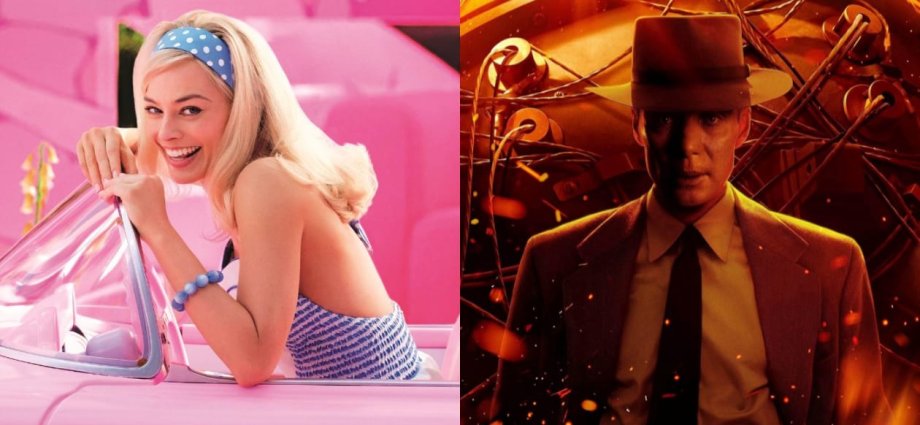Pre-release expectations were already “stratospheric”, but the unlikely pairing of “Barbie” and “Oppenheimer” around the world has “helped fuel the biggest collective weekend at the box office since the pandemic”, said Rebecca Rubin in Variety – music to the ears of their respective film studios, Warner Bros. Discovery and Universal, and a potential lifeline for beleaguered cinema chains.
The “Barbenheimer” cultural craze, which began as a meme on the internet, stoked US sales of $82.4m for the biopic about “the father of the atomic bomb”, while Barbie pulled in $162m. Warner Bros. reckons that’s just the start, observing: “This doll will indeed have long long legs.” Shares in AMC Entertainment soared, said Anita Ramaswamy on Reuters Breakingviews as record-breaking sales suggested that the US cinema chain would survive.
On this side of the Atlantic, both Vue and Odeon reported a “booking frenzy”, said Dominic Walsh in The Times. A remarkable 23% of Vue’s customers bought tickets for both movies at the same time. The two films took £30m at the box office in their opening weekend in Britain, making it the most successful weekend for British cinemas since 2019.
With the verdicts now in, here’s what the film critics said about the blockbuster double act…
Barbie review ****
“Anthropologists believe there may be tribes living in the farthest reaches of the Amazon” who missed the marketing campaign for Greta Gerwig’s $145m, Mattel-sponsored Barbie movie, but the rest of us had our eyeballs melted by it for weeks, said Robbie Collin in The Daily Telegraph. So it’s an “unexpected pleasure” to report that it’s not the “blunt-force cash grab many of us feared. In fact, it’s deeply bizarre, conceptually slippery and often roar-out-loud hilarious.”
Margot Robbie is perfectly cast as “Stereotypical Barbie”, a “habitually smiley creature” whose life in Barbieland (a fantasy world in which multiple different Barbies hold sway) is disrupted when she finds herself “haunted by thoughts of sadness, anxiety and death”, said Mark Kermode in The Observer. “Worse still, she develops flat feet and (whisper it!) cellulite – two horsemen of the Barbie apocalypse.” A visit to Kate McKinnon’s “Weird Barbie” (“She was played with too hard”) reveals that a wormhole has opened between Barbieland and the real world. So our heroine must venture there, accompanied by Ken (Ryan Gosling), who learns that the real world is dominated by something called “The Patriarchy”, which, having always been in thrall to Barbie, he rather likes. It all adds up to a “riotously entertaining candy-coloured feminist fable”.
I saw the film with my 20-year-old daughter who loved it, said Sarah Vine in the Daily Mail. Me, not so much. “My main criticism, actually, has nothing to do with the subject matter.” Barbie or no Barbie, it’s just not a very good film. It is uneven and disjointed, and “deeply anti-man”. Every male character is “an idiot, a bigot or a sad, rather pathetic loser”, and women’s liberation is framed “not as a movement based on achieving equality between the sexes, but as a cultural revenge vehicle”.
Seeking to both satirise and celebrate Barbie, the film falls into what one critic has called the “reflexivity trap”, said Adrian Horton in The Guardian: the idea that acknowledging a fault absolves you of that fault. So it sends up Mattel, but Mattel will profit very nicely from it. The result is a film that, for all its buoyancy and fun, “feels stuck in a loop of intense self-awareness”.
Oppenheimer review ****
“Oppenheimer” is billed “as a biopic of theoretical physicist J. Robert Oppenheimer”, said Wendy Ide in The Observer. “But ‘biopic’ seems too small a word to contain the ambition and scope of Christopher Nolan’s formidable if occasionally unwieldy” film about the so-called “father of the atomic bomb”. Although this “dense and intricate period piece” weaves together “courtroom drama, romantic liaisons, laboratory epiphanies and lecture hall personality cults”, it is perhaps most of all a “monster movie”. Cillian Murphy’s Oppenheimer is “an atomic-age Frankenstein, a man captivated by the boundless possibilities of science” who realises too late that his creation has a limitless capacity for destruction. “Murphy’s far-seeing ice-chip eyes have never been put to better use.”
Jumping between several timelines, the film follows “Oppie” from the 1920s and into old age, said Manohla Dargis in The New York Times. And though its all-star cast is distracting (Matt Damon, Robert Downey Jr, Gary Oldman, Kenneth Branagh and others pop up), it builds into a “brilliant” drama about “genius, hubris and error”.
It wasn’t the “instant masterpiece” I was hoping for, said Matthew Bond in The Mail on Sunday. The script feels “overpolished”; and the “coda that follows the Trinity test explosion and the attacks on Hiroshima and Nagasaki is a definite slog”. It’s also a shame that female characters are so peripheral, said Radhika Seth in Vogue. Oppenheimer’s wife (Emily Blunt) is a “lipsticked blur”; and we learn virtually nothing about his lover Jean Tatlock (Florence Pugh) other than that she’s “emotionally turbulent” and hates flowers. The women are a bit “one-dimensional”, said Christina Newland in The i Paper. There’s also a lot of “clanging” historical name-dropping (“What’s this place called? Los Alamos”, etc.). But the film survives its flaws, which “is testament to the fascinating material and the might of its performances”.











